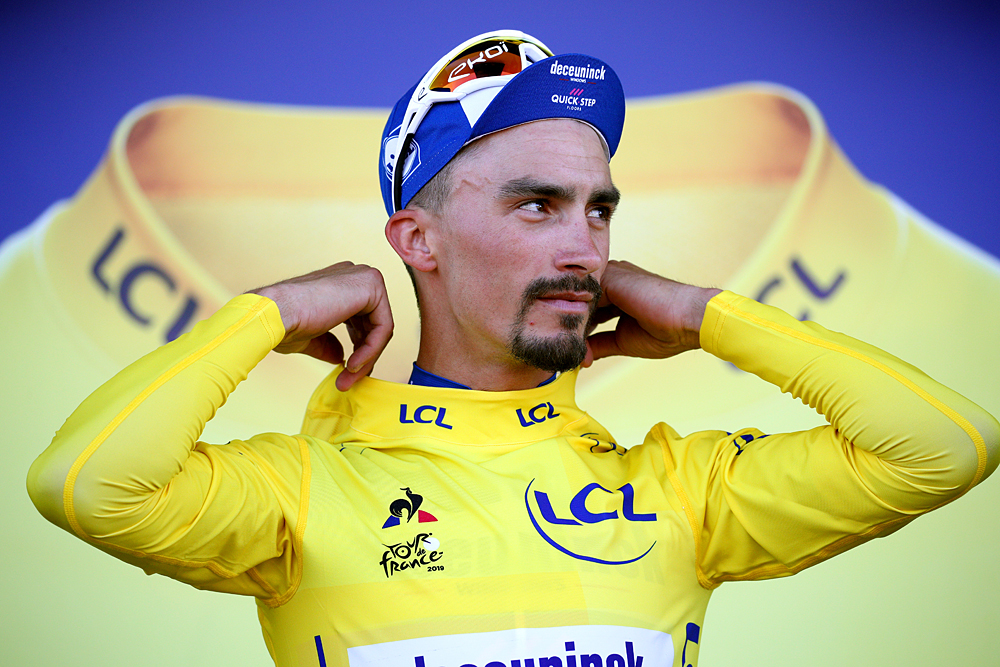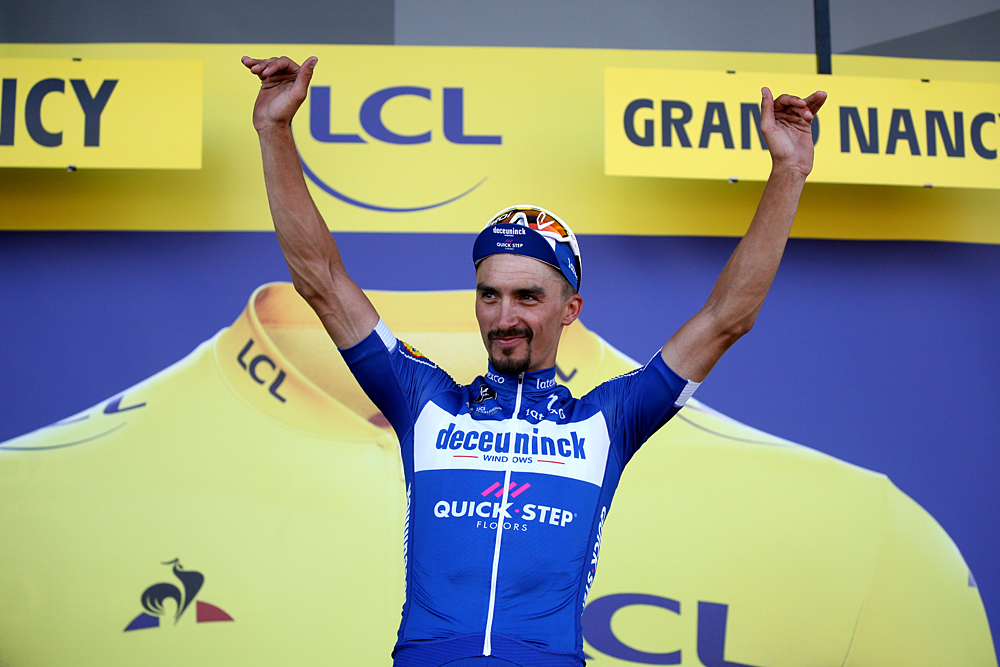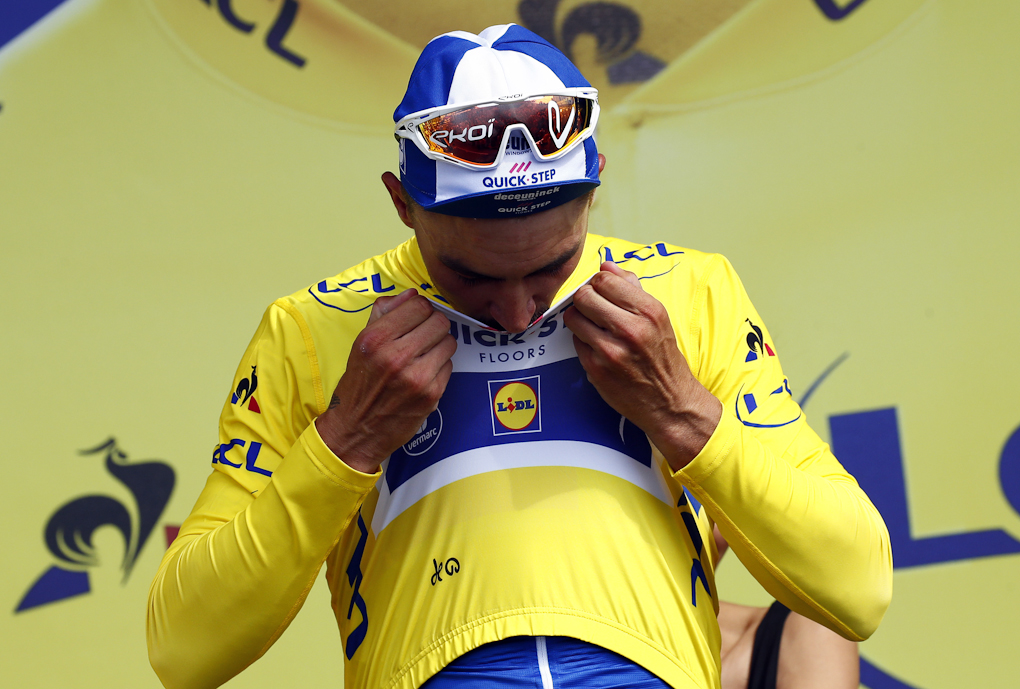No limits on Alaphilippe at the Tour de France
Voeckler maintains Frenchman can hold yellow jersey as far as the Pyrenees




How far can Julian Alaphilippe go at this Tour de France? There seems to be no limit to his array of talents, after all, just as there is rarely any limit placed on the ambitions that are automatically foisted upon a Frenchman who wears the maillot jaune in July. It's a heady combination.
Ordinarily, a puncheur who claims the overall lead in the opening days of the Tour is an ephemeral leader, and Thursday's first mountaintop finish at La Planche des Belles Filles would seem an obvious place for Alaphilippe to concede the yellow jersey and recede from the upper reaches of the general classification.
The striking, almost nonchalant way in which Alaphilippe seized the precious garment on stage 3, however, suggested that he might prove a difficult out for the overall favourites when the race climbs above 1,000 metres later this week.
The uphill finale in Épernay lent itself obviously to his talents, but rather than sit and wait for his coronation there, Alaphilippe stood and seized the crown like Napoleon at Notre-Dame, accelerating clear alone with some 16km still to race. He held off the chasing peloton by 26 seconds to win the stage and claim the overall lead.
Alaphilippe enjoyed an untroubled opening day in the yellow jersey on stage 4. There was a brief cameo on the front of the peloton in the final kilometre in Nancy, and there was a double celebration for Deceuninck-QuickStep at the finish, as Elia Viviani claimed the bunch sprint. In the overall standings, Alaphilippe retains his 20-second lead over Wout van Aert (Jumbo-Visma), with the bulk of the podium contenders more than 40 seconds behind.
"It was a special day, I really enjoyed every kilometre," said Alaphilippe, who agreed that life on the Tour felt altogether different in the yellow jersey. "I felt that already when I walked down the steps of my bus at the start, I could hear the support of the public all day like I'd never heard it before. It was something very special."
This year's Tour marks the centenary of the maillot jaune, and in the build-up to the race, much has been written about the idea that the precious garment confers almost mystical powers upon those who wear it. Tour history is dotted, after all, with men who have over-achieved to varying degrees while dressed in yellow, though almost as many have found the burden a heavy one to bear.
Get The Leadout Newsletter
The latest race content, interviews, features, reviews and expert buying guides, direct to your inbox!
Thomas Voeckler, who enjoyed 20 days in yellow on the 2004 and 2011 Tours is among those who profess a deep belief in the supposedly invigorating qualities of a stint in the most hallowed item of clothing in the sport. In 2011, Voeckler moved into yellow on a transitional stage to Saint-Flour, and then proceeded to defy all logic and bely his own pedigree to hold the jersey all the way to l'Alpe d'Huez, just two days from Paris. He would eventually finish 4th overall.
Speaking on radio station Europe 1, the newly-appointed French national coach was adamant that Alaphilippe could defend his jersey on La Planche des Belles Filles on stage 6 and even remain atop the overall standings as far as the time trial in Pau on stage 13.
"He doesn't yet know the kind of motivation and strength that the maillot jaune gives you. I'd bet that he'll keep the jersey for nine or ten days, until the time trial," Voeckler said. "I'm going against the grain because nobody sees it, but I believe it. La Planche isn't very long. If it was the Iseran or Val-Thorens, I'd say he couldn't do it, but there aren't big cols on Thursday."
Alaphilippe, for his part, has been downbeat about his prospects on La Planche – "It's too hard for me," he insists – and it is an opinion shared by his cousin and coach Franck. "There are a lot of climbs before the ascent of La Planche," Franck Alaphilippe told L'Équipe. "If the race kicks off early, then it will be hard for Julian."
Hinault and a future in the Grand Tours
Five-time Tour winner Bernard Hinault was more circumspect than Voeckler when asked to predict the length of Alaphilippe's tenure in yellow, though he was unstinting in his praise for how the 27-year-old had taken possession of the jersey in Épernay. Le Blaireau has rarely been much given to extolling the merits of the generations that followed him, but he made a notable exception for Alaphilippe.
"I saw the cycling that I knew when I was a rider," Hinault told Le Parisien. "Julian Alaphilippe is exceptional because he believes in himself. He rides like someone from my era. Doubt, that's for others. He knows where he's strong and when he wants to attack. He doesn't look at how the others are. No, he attacks."
On Tuesday evening in Colmar, Alaphilippe smiled when asked about such comparisons. "I'm happy to be compared to riders who rode like me in the past because I like to go on the attack," he said. "But obviously, I'm riding in the present."
Alaphilippe's almost overwhelming strength has carried him to a remarkable sequence of victories in 2019. So far this year, he has won 11 races, including Milan-San Remo, Flèche Wallonne, Strade Bianche, two stages of Tirreno-Adriatico and a stage at Critérium du Dauphiné.
It is a haul that finds some obvious parallels in Laurent Jalabert's startling 1995 palmarès. That July also marked Jalabert's transfiguration from sprinter and Classics hunter to Tour contender. After a spell in yellow in the opening week, he went on the place 4th overall, scaring Miguel Indurain on the road to Mende in the process.
It would be premature in the extreme to suggest that Alaphilippe can do something similar here, but Voeckler maintained that his display at Épernay proved him to be the best rider in the Tour, at least for now. "He was the strongest, and by some distance, of the entire peloton of the Tour de France at the moment when he attacked," Voeckler said.
Hinault, for his part, downplayed the idea that Alaphilippe might hold the jersey on La Planche des Belles Filles and suggested that any overall ambitions would have to wait for later in his career. "He has a bit of an advantage on the good climbers, but you can't just say he's going to win the Tour," Hinault said. "The high mountains risk being a too complicated for him."
It is a point of view that was echoed by Deceuninck-QuickStep manager Patrick Lefevere, who recently signed Alaphilippe to a long-term contract with the team. In the here and now, Lefevere insisted, Alaphilippe and the team have more pressing ambitions in one-day races.
"I know that you, the French, you're still waiting for someone to win the race overall," Lefevere told L'Équipe. "But Julian has other objectives before that. Above all, he wants to win the Worlds, then Lombardia, the Tour of Flanders.... After that, he will be able to think about the Tour."
Alaphilippe, meanwhile, had thoughts only for Wednesday's stage to Colmar, which features the climbs of the Haut-Koenigsburg, Trois-Épis and Cinq Châteaux in the finale. The stage is one that obviously suits Alaphilippe, though it remains to be seen if the duty of retaining the maillot jaune tempers his aggression.
"Tomorrow will be harder, because I have to defend the jersey," Alaphilippe said. "But I'm motivated for that."

Barry Ryan was Head of Features at Cyclingnews. He has covered professional cycling since 2010, reporting from the Tour de France, Giro d’Italia and events from Argentina to Japan. His writing has appeared in The Independent, Procycling and Cycling Plus. He is the author of The Ascent: Sean Kelly, Stephen Roche and the Rise of Irish Cycling’s Golden Generation, published by Gill Books.